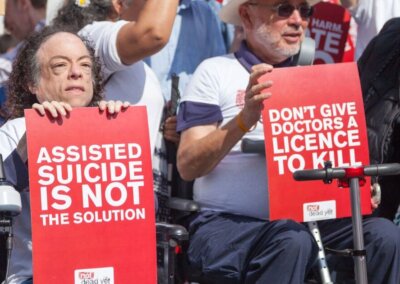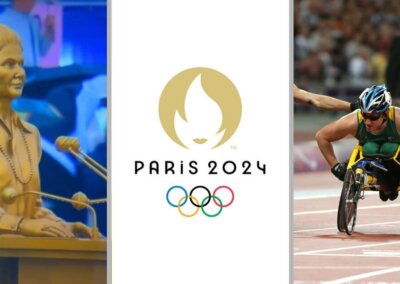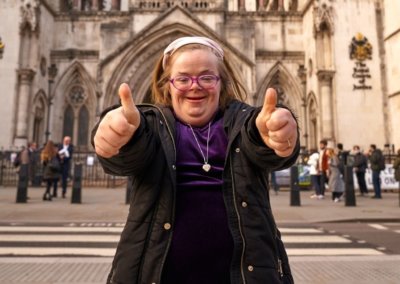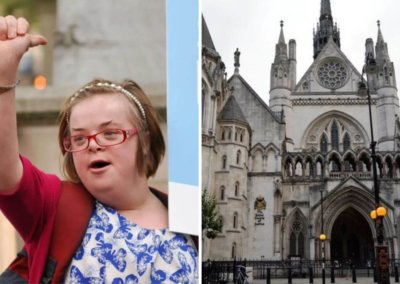The UK Government has announced that it will be proceeding with the procurement and rollout of a nationwide testing scheme for Down’s syndrome which will likely lead to an increase of babies with Down’s syndrome being aborted.
An investigation by the Sunday Times published earlier this year show that the number of babies born with Down’s syndrome has dropped by 30% in NHS hospitals that have introduced new non-invasive prenatal tests.
The figures, released as a result of a number of Freedom of Information requests, show that among the 26 hospitals that provided the tests, there was a change in the birthrate for babies with Down’s syndrome from 1 in 956 births in 2013 to 1 in 1,368 in 2017.
Down’s syndrome advocates have called on the Government to halt the roll-out of the new tests and undertake an inquiry into the impact that the tests are having on the birth numbers of babies with Down’s syndrome.
The Department of Health has previously admitted that no assessment was made of the impact that the roll-out of the new tests will have on the lives of people with Down’s syndrome.
Collete Lloyd, whose daughter Katie, 22, has Down’s syndrome obtained the figures. She told The Times that she would struggle to explain to her daughter how the tests could be justified, saying:
“How would I tell her, ‘We have a test so that women can make a choice of whether they want to keep a baby like you or not’? It is not a pro-choice or pro-life thing at all. It is the woman saying: ‘I want a baby but I don’t want a baby like that.’”
Only four babies were born in Oxfordshire this year with the condition compared with 12 in 2015.
A study by the National Institute for Health and Research projected that the proposed implementation will result in more babies with Down’s syndrome being identified each year and based on the current 90% of parents with a diagnosis that seek an abortion, this is projected to result in more abortion where babies have Down’s syndrome.
Lynn Murray, spokesperson for the Don’t Screen Us Out campaign said: “As a mother of a daughter who has Down’s syndrome, I see every day the unique value she brings to our family and the positive impact she has on others around her.
“Figures released earlier this year show that the fears of the Down’s syndrome community that rolling out these tests would lead to a large drop in the number of babies with Down’s syndrome were not unfounded.
“While the screening itself is being heralded as a move to reduce the number of miscarriages associated with invasive amniocentesis, figures published in the Sunday Times last December revealed that the number of babies born with Down’s syndrome fell by 30% in NHS hospitals that have already introduced the new test. When this test is rolled out across the country, we can expect to see this situation replicated elsewhere. Such outcomes are likely to have a profoundly negative impact on the Down’s syndrome community.”
“We are calling on the Government to halt the further roll-out of the tests on the NHS immediately and to undertake an urgent inquiry into the impact that these tests are having on birth numbers of babies with Down’s syndrome.”
Catherine Robinson, spokesperson for Right To Life UK said: “Our current law allows babies with Down’s syndrome to be aborted right through to birth. Already 90% of babies diagnosed in the womb with Down’s syndrome are aborted in the UK. New non-invasive prenatal tests are likely to lead to even more babies who have Down’s syndrome being aborted.
“The Government should not be rolling out these tests if there is evidence that they are leading to more babies with Down’s syndrome being aborted. There is clear evidence this is the case, so it’s time that the Government pulled the rollout.
Follows Government decision to introduce abortion up to birth for Down’s syndrome to Northern Ireland
Last year, in the absence of a functioning Northern Ireland Assembly, politicians in Westminster voted to impose an abortion regime on the province.
The Government was not required to introduce abortion for cleft lip, or other disabilities such as Down’s syndrome, to Northern Ireland.
Yet, to the dismay of disability advocacy groups, those with disabilities and their families, the Conservative Government introduced disability-selective abortion right up to birth.
In a letter to the Belfast Telegraph, the 24-year-old disability campaigner Heidi Crowter said: “Boris Johnson’s Government did not have to introduce abortion for babies with Down’s syndrome up to birth to Northern Ireland. They chose to do this.
“That’s both hurtful and offensive. My life has as much value as anyone else’s.
She added: “Do not make the mistake which was made in Great Britain in allowing discrimination against people like me just because we happen to have Down’s syndrome.
‘Screening out’ babies with Down’s syndrome seen as ‘cash cow’
Earlier this year a spokesperson for a Chinese biotech firm declared “screening out” babies with Down’s syndrome is a “cash cow” funding the growth of the whole business.
The admission came from a spokesperson for BGI Group – a Chinese genetics conglomerate whose main business is offering non-invasive prenatal tests, primarily used to diagnose Down’s syndrome.
In a segment from an Aljazeera documentary titled Genesis 2.0, the spokesperson gestures towards a digital map of the world and says: “You can see clearly, especially for Down’s syndrome, we have nearly two million samples all over the world. This part is, what we call, BGI’s cash cow, making money to support the growth of the whole group.”
Dismissing a query over potential ethical concerns, she coldly adds: “…with the use of our technology, we could avoid the birth of birth defect, like a Down’s syndrome birth, a Down’s syndrome child, we can screen them out, we can avoid the birth of them.”
Parents under pressure to terminate pregnancies
A recent report revealed that pregnant mothers who refuse to abort their children with Down’s syndrome are being pressured by some medical professionals to change their decision.
One mother, whose child is now three-years-old, said medical professionals told her they could leave her baby with Down’s syndrome to die if it was struggling after birth.
Another mum told how even at 38 weeks pregnant she was being offered an abortion. Currently, abortion for disabilities including Down’s syndrome, cleft lip and club foot is legal right through to birth in England, Wales and Scotland, and 90% of babies with Down’s syndrome identified in the womb are aborted.
Landmark case
Earlier this year, disability rights campaigner Heidi Crowter launched a landmark case against the UK Government over current abortion legislation that singles out babies with disabilities, allowing abortion right through to birth for conditions including Down’s syndrome, cleft lip and club foot.
Heidi’s legal challenge has generated widespread support from those with first-hand experience of Down’s syndrome, pro-life campaigners, disability advocates and more.
Over 5,000,000 people have watched Heidi tell Channel 5 the current law is “deeply offensive” and many more have seen her tell the BBC’s Victoria Derbyshire programme that the current law makes her feel “unloved and unwanted”.












